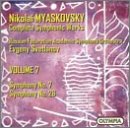| All Artists: Nikolai Myaskovsky, Evgeny Svetlanov Title: Myaskovsky: Complete Symphonic Works, Volume 7: Symphonies Nos. 7 & 26 Members Wishing: 0 Total Copies: 0 Label: Olympia Release Date: 11/26/2002 Genre: Classical Style: Symphonies Number of Discs: 1 SwapaCD Credits: 1 UPCs: 515524007379, 5015524407377 |
Search - Nikolai Myaskovsky, Evgeny Svetlanov :: Myaskovsky: Complete Symphonic Works, Volume 7: Symphonies Nos. 7 & 26
 | Nikolai Myaskovsky, Evgeny Svetlanov Myaskovsky: Complete Symphonic Works, Volume 7: Symphonies Nos. 7 & 26 Genre: Classical |
Larger Image |
CD Details |
CD ReviewsA mystique Answer to the Sixth & the folklore Twenty-Sixth. David A. Hollingsworth | Washington, DC USA | 04/26/2003 (5 out of 5 stars) "After the stormy, heart-wrenching, Sixth Symphony written by 1923, Myaskovsky's Seventh, finished interestingly enough by 1922, returns to the Scriabinesque mysticism that's all too familiar in the composer's earlier works. The opening Andante sostenuto calmo is mysterious & ambiguous in outlook, quite a foretaste to the Thirteenth Symphony written ten years later. Even the purposeful Allegro minassimo, poco stravagante strangely looks upon the magic of Rimsky-Korsakov's later operatic scores, like the "Golden Cockeral," and fleetingly upon Stravinsky's "The Firebird." The Andante evokes the instropection of the Sixth (listen to how the start of this section closely relates to the final passages of the Sixth Symphony's first movement). The introspection & melancholy are spellbinding here, searching, yearning for something lost, and not entirely at ease though with the composer somehow at peace with himself, but not for long. The Allegro scherzando et tenebroso is quite dramatic and vivid, again looking fleetingly upon Stravinsky. The beautiful yet haunting pastoral theme in the previous section re-emerges, though with a greater poignancy. It's a symphony of considerable contrasts and a testament of Myaskovsky's continued search for a more personal voice.The Twenty-Sixth Symphony "On Russian Themes" (1948) was composed when Myaskovsky's personality was firmly solidified: with his musical voice having presence and unrelentingly so. Yet listening to this symphony, and this piece manages to be not as personal as many of his more successful scores (the Second Sonata for Cello and Piano written in the same year comes across as more beguiling & Myaskovskian). Like the Fifth Symphony "The Russian" of 1948 (begun in 1942) of Leningrad's highly-regarded pedagogue & composer Vladimir Shcherbachov, Myaskovsky's work is more or less a cross-over of "memories" of the glorious past (though the former have ideas that are more interesting & epic though perhaps not as dignified as the latter). Structurally, the Symphony is quite episodic and the thematic invention and personality are drowned by the lack of purpose in its overall aims. The second movement is the most successful, but pale in comparison to, say, the Andante movement of his Twenty-Third. But there are impressive moments in the closing bars of the work, with the feeling of nostalgia finally sounding genuine. So, not quite a piece for repeated listening (in a short span of time at least), but a piece that in some ways shows the weight of Socialist Realism re-asserting itself at full force since the Second World War. It was written the same year Zhadanov, with the help of Khrennikov, attacked leading composers, artists, and writers during the notorious Conference of Soviet Musicians; the event that proved disgraceful particularly for those who cherish art for art's sake. But the dignity behind this symphony shows why Myaskovsky ought to be appreciated and admired: for an artist as honest and self-critical as he was, hardly anything written can ever come across as cheap, even when the quality of his materials at times can be rather inconsistent.Svetlanov coaxed his very fine orchestra to bring out the warmth of these works, especially in the slow movements. And I like the way they painted the picture of the composer with such a journey of musical self-discovery, who had a very uneasy life, and yet managed to win many admirers during his life and beyond. While the performances are rewardingly anything but one-dimensional, the recordings are not as multi-dimensional and atmospheric as, say, Chandos'. But, it's an important release nevertheless.An Afterthought:
Perhaps Olympia Compact Disc Ltd. would have the incentive to track down the Shcherbachov recording for re-issue. It was recorded by Melodiya in the 1950s (or late 1940s) featuring Nathan Rakhlin and the Leningrad State Symphony Orchestra. His highly talked about "Blok" Symphony would likewise be quite a revelation, especially since it has yet to exist outside the printed score buried somewhere. It created quite a stir in it's 1926/1927 premiere, much like Popov's First Symphony of 1935. But in the meantime..., do enjoy the Myaskovsky, for he's among those who's quite a revelation in his own right, and rewardingly so. Dave" |
